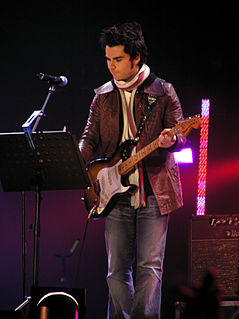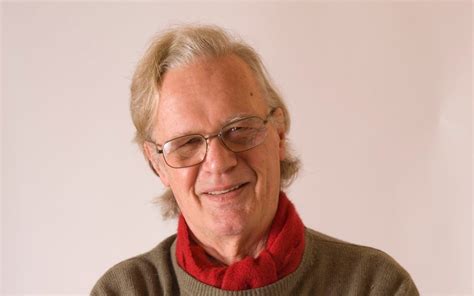Top 200 Alarming Quotes & Sayings - Page 4
Explore popular Alarming quotes.
Last updated on April 17, 2025.
My parents have always had a very limited command of English. Of course, when we first arrived in the UK, none of us spoke English, but it's much easier for a child to pick up languages. But the problem was not a lack of English; the problem was poor communication in any language. Remember, my parents came from rural Bangladesh with little education. It was alarming for them, I'm sure, to watch their boy very quickly exhaust whatever ability they had to teach the child something.
The most alarming of all man's assaults upon the environment is the contamination of air, earth, rivers, and sea with dangerous and even lethal materials. This pollution is for the most part irrecoverable; the chain of evil it initiates not only in the world that must support life but in living tissues is for the most part irreversible. In this now universal contamination of the environment, chemicals are the sinister and little-recognized partners of radiation in changing the very nature of the world-the very nature of its life.
Every song I've written, it's about what I've gone through, good or bad. It kind of comes out of me, and I'm grateful for that. I've got friends who are back home who've got no way to express that, and they're kind of in a different position in life. It's alarming to me that I've written something on my bedroom floor when I was 19 or something, and then there's 50,000 people that know the words, and they've got a similar feeling. If you thought about it too much, your head would blow up.
There's a diversion between economic reality - integration, global village, everybody depending on everybody else - and cultural reality, which is people feeling invaded, undermined, threatened, wanting to have "stand-your-ground" legislation all over the place. It's alarming because at the moment, the fear is outweighing the benefits, and that's partially because the benefits have been so unequally distributed that lots of people don't feel better off. They feel threatened, angry and despairing.
This morning, as Charlotte approached the brick facade of Hartnett, she found herself overcome with a great sense of dread. It hit her with a strange and sudden force, and she had an overwhelming urge to turn back, get into bed and not go out for about three weeks. She stopped in her tracks. The feeling itself was alarming to Charlotte - was she sensing something? Something dangerous? And was it something supernatural or just middle school? Sometimes it was hard to tell the difference.
When I first began examining the global-warming scare, I found nothing more puzzling than the way officially approved scientists kept on being shown to have finagled their data, as in that ludicrous "hockey stick" graph, pretending to prove that the world had suddenly become much hotter than at any time in 1,000 years. Any theory needing to rely so consistently on fudging the evidence, I concluded, must be looked on not as science at all, but as simply a rather alarming case study in the aberrations of group psychology.
Voices surround us, always telling us to move faster. It may be our boss, our pastor, our parents, our wives, our husbands, our politicians, or, sadly, even ourselves. So we comply. We increase the speed. We live life in the fast lane because we have no slow lanes anymore. Every lane is fast, and the only comfort our culture can offer is more lanes and increased speed limits. The result? Too many of us are running as fast as we can, and an alarming number of us are running much faster than we can sustain.
I drink much less than most people think, and I think much more than most people would believe. I am quite sincere about some of the things which people take very lightly, and almost insultingly unconcerned about some of the things which people take most seriously. In short, I am basically antisocial: certainly not to an alarming degree , but just more so than I appear to be.
I think that we're at an alarming moment in American political development and maybe in world political development, because the United States is so influential. If the trends of the last thirty or forty years are not halted and reversed - and those trends include increasingly inequality, a crumbling public life, a disintegrating public infrastructure, an exhausted ecology, and a huge war arsenal, and more and more war making - then I'm rather gloomy about the prospects for the American future and the harm that the United States could do to the world.
The other me, who did not mean to drown herself, went under the sea and remained there for a long time. Eventually she surfaced near Japan and people gave her gifts but she had been so long under the sea she did not recognize what they were. She is a sly one. Mostly at night we commune. Night. Harbinger of dream and nightmare and bearer of omens which defy the music of words. In the morning the fear of her going is very real and very alarming. It can make one tremble. Not that she cares. She is the muse. I am the messenger.
A billion homo sapiens are added every 11 years to the planet. The hypertrophy of a single species pushes other life-forms out of bed and into extinction. The decline of biological diversity is real and severe. The alarming loss of soil fertility, forest cover, and coral reef viability and the release of fossilized CO2 that nature put away 300 million years ago in its march toward greater diversity - all these "losses" and many others are the result of one life-form annihilating other life-forms in its immoral confusion of "dominion" with "domination."
Yes, I know,’ she said in answer to the unasked, for there was no time for explanations. ‘Yes. My face is spoilt.’ Grandible’s jowl wobbled and creased. Then, for the first time that Neverfell could remember, he changed to a Face she had never seen before, a frown more ferocious and alarming than either of the others. ‘Who the shambles told you that?’ he barked. ‘Spoilt? I’ll spoil them.’ He took hold of her chin and examined her. ‘A bit sadder, maybe. A bit wiser. But nothing rotten. You’re just growing yourself a rind at last. Still a good cheese.
WE two boys together clinging, One the other never leaving, Up and down the roads going, North and South excursions making, Power enjoying, elbows stretching, fingers clutching, Arm'd and fearless, eating, drinking, sleeping, loving. No law less than ourselves owning, sailing, soldiering, thieving, threatening, Misers, menials, priests alarming, air breathing, water drinking, on the turf or the sea-beach dancing, Cities wrenching, ease scorning, statutes mocking, feebleness chasing, Fulfilling our foray.
Educators, long disturbed by schoolchildren's lagging scores in math and reading, are realizing there is a different and more alarming deficiency: emotional literacy. And while laudable efforts are being made to raise academic standards, this new and troubling deficiency is not being addressed in the standard school curriculum. As one Brooklyn teacher put it, the present emphasis in schools suggests that "we care more about how well schoolchildren can read and write than whether they'll be alive next week."
In the past, I have made a point of pointing out that Donald Trump is not ideological. Now, to me, that means more than he's not just conservative or liberal. But I guess I'm gonna need to add to that. When I say he's not ideological - and I'll explain that again - he's not a conservative, and he's not a liberal. He knows what both things are. It's just not how he looks at the world, and it's not how he sees people. Now, to some people that's refreshing and it's good. To other people, it's alarming.
I think that's what's - one of the things that is alarming to me is [Donald] Trump, and I think Trump supporters seem to believe, he won, huge upset, full credit to him, and has got the wind at his back. And Republicans on The Hill do want him to succeed, obviously, and they're deferring to him more than they deep down in private sort of wish - want to, but they are going to defer to him publicly for awhile. But I think that is going to run out faster than people think.
As much as we - in a revisionist way - tell ourselves that we've always been a righteous country with a couple of swerves off the path, we need to look back and see that we've always also been a racist country and have had a tendency towards banal aggressiveness. The thing that's alarming is not so much that a few people in America at the top are initiating these crazy policies, but that the middle is willing to go there too. There's a strange movement of the middle to this position of banal aggressiveness.
The conclusions seem inescapable that in certain circles a tendency has arisen to fear people who fear government. Government, as the Father of Our Country put it so well, is a dangerous servant and a fearful master. People who understand history, especially the history of government, do well to fear it. For a people to express openly their fear of those of us who are afraid of tyranny is alarming. Fear of the state is in no sense subversive. It is, to the contrary, the healthiest political philosophy for a free people.
Right now, I see a lot of alarming trends inside Russia, especially in Siberia, which I represent in the parliament. People start to ask questions: If we mine all the natural resources - if we have all the oil, all the gas, all the coal, all the gold, all the diamonds - why the hell do we need central Russia? They are just eating at our resources. Without Moscow having a response for this, it would face very nasty questions such as one that was asked during my recent reelection campaign - it actually became a slogan of my campaign - "Stop feeding Moscow."
Both sameness and difference are issues for us. A sign of cultural homogenization is that languages are disappearing at an alarming rate. I am heartened by signs that some peoples are fighting back, e.g., the revitalization of the language of the Wampanoag tribe in Massachusetts. But if we reject essentialism about culture, we will be cautious about overgeneralizing about what homogenization is and to what degree it exists. If we think of cultures as dynamic, internally diverse and contested, we will be aware that what looks like homogenization may be deeper down this more complicated thing.



















